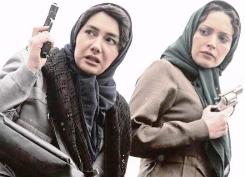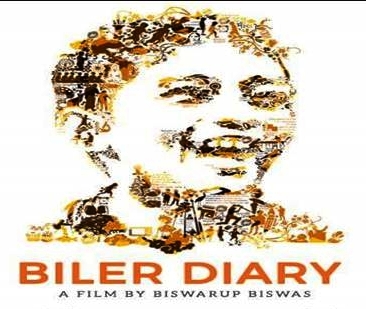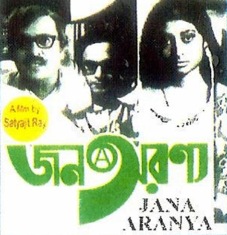|
|
||
|
Pro Tools
FILMFESTIVALS | 24/7 world wide coverageWelcome ! Enjoy the best of both worlds: Film & Festival News, exploring the best of the film festivals community. Launched in 1995, relentlessly connecting films to festivals, documenting and promoting festivals worldwide. Working on an upgrade soon. For collaboration, editorial contributions, or publicity, please send us an email here. User login |
16th Third Eye Asian Film Festival: IX
16th Third Eye Asian Film Festival: IX Biler Diary, Cyanide and Jana Aranya. A Bengali film about a boarding school based on Hindu religious values, an Iranian political thriller about the period immediately preceding the Islamic revolution and a raved work of the master, Satyajit Ray—these were the last feature films I saw at the 16th Third Eye Asian Film Festival, Mumbai. The festival was organised in December 2017 by the Asian Film Foundation and P.L. Deshpande Maharashtra Kala Academy, and co-organised by Prabhat Chitra Mandal and Akhil Bharatiya Marathi Chitrapat Mahamandal. An annual event, it is supported by Department of Culture, Government of Maharashtra. Screenings were held at Ravindra Natya Mandir Mini Auditorium, Mumbai, which has been the venue for the last few years.
Biler (Biley’s) Diary, 2017 School-based stories are usually the same, across time and geography. Some slow-learners, some smarties, some terrorising teachers and some kind souls, some bullies and some protectors, some ‘ghosts’ and some pranksters. So, what is different about Biler Diary? It is set in a real religious school, the Ramakrishna Mission Vidyalaya, Narendrapur, and is narrated through the eyes of a graduate, who reminisces about his time there. Biler Diary begins with a 'retreat', in which alumni from different batches of a residential school have travelled to their alma mater, for a reunion. Anabil, one of the alumni, is presently working with UNICEF India as a "child protection specialist". First, they play a kind of singing game, each song being chosen from Hindu religious texts. Then, Anabil narrates the story of his childhood days. When he was admitted to the residential school by his parents, Anabil was a shy student, with below average abilities. For such a child, time table specific, demanding, hostel life was not easy. A mischievous senior student named Bishey and his gang added to Anabil’s woes. Due to similarity in names, Anabil was nicknamed 'Beelay' (the pet name of Swami Vivekananda) by his seniors. With the passage of time, when it was almost certain that Anabil would fail to adapt, a new monk arrived as the hostel-warden, replacing the tyrannical Kalu Mahaaraaj. The new monk, Kanu Mahaaraaj, by virtue of his gentle qualities, immense knowledge of Hindu scriptures and great command over music and singing, became Anabil's inspiration. At about this time, Anabil found a magical diary that completely changed his life. According to the makers, Biler Diary “is an attempt to bring in front of the world the treasure trove that is stored in the ‘Narendrapur Ashrama’, built around the ideologies of Sri Ramakrishna, Maa Sarada Devi and Swami Vivekananda.” In that, they have largely succeeded. Shot entirely within the picturesque campus premises of Ramakrishna Mission Ashrama Narendrapur, with students, teachers and non-teaching staff playing characters in the film, adds a touch of authenticity. Conceptualised by a few alumni from a traditional Indian Ashrama School, run by Ramakrishna Mission, an Indian spiritual and educational organisation, the idea was turned into a screenplay by and directed by alumni Biswarup Biswas (Nabab, Dhat Teri Ki, Boss 2), who also directed the film. Naturally, it was not too difficult to recreate the old days and the ambience. Besides a few universal truths, the film has a large dose of teachings of Swani Vivekananada. Except for the mention of two names of children that did not appear Hindu, there is nothing to suggest that the school propagates anything but essential Hindu philosophy and rituals. The film is a very thinly veiled attempt to glorify the school and its ideals. Somebody with a deep grounding in theology might evaluate the content the content better than me. The director keeps a few surprises up his sleeve, and the climax is one such trump. Technique-wise, it has a well-integrated sound-track, even if it is too loud at places. Some co-incidences are very conveniently woven in. Most of the cast have put in real hard work and the decision to use real-life characters has paid off. Samadarshi Dutta, Sanjoy Biswas, Sanjib Sarkar, Barun Chakraborty, Partha Sarathi Deb, and many child actors from 24 schools around Kolkata play their parts, mostly themselves. Biler Diary is shot in and around the picturesque campus of Narendrapur Ramakrishna Mission Ashrama, and runs for 112 minutes, including many religious songs and chants. Biler Diary is a propaganda film, a promotional effort, a docu-feature for a cause. It will work well on that level. Whether such a film be shown at and international film festival is an idea that can be debated. Rating: ** ½ Cyanide, 2016 Cyanide? An Iranian political thriller? Somebody must have got it wrong. Let’s google it. So, it is an Iranian film, and it is a political thriller. No, they would not let a political film be made in 2016. Iran does not even allow many social themes, finding socio-political under-currents in them. But they would not deny this one, since it is the tale of dissidents v\s Reza Shah Pahelvi’s regime, that fell in 1978, and the Shah, who had to seek asylum in the USA. Cyanide is not about the deadly poison, rather it is about militant opposition members who would rather commit suicide by swallowing cyanide than fall into the hands of sadist torturers. Mainly, it is about Mojahedin-e-Khalq Organization (MKO, MeK – also known as People’s Mujahedin of Iran, PMOI), an Iranian political–militant organisation in exile, that carried out many terrorist operations during the late 1970s, to overthrow the Iranian government. Starring Hamed Komeili and Hanieh Tavassoli, Cyanide tells the story of Vahid Afrakhteh, a devout Muslim member of the MKO military unit during the reign of Iran’s last monarch, Mohammad-Reza Shah. He is gradually changed into an obedient Marxist, under the influence of his fellow member, Taqi Shahram. Vahid is arrested by Iranian intelligence agents after assassinating a U.S. military envoy in Iran. He voluntarily co-operates with SAVAK (the Iranian Intelligence Agency) to help arrest his band-mates, all of whom are executed. A website called Iran Probe challenges the account of history as interpreted by Cyanide’s director Behrooz Shoeibi. It insists that, “This movie, funded by the Ministry of Intelligence and Security (MOIS), delivers a defaced story about a portion of the history of the People's Mojahedin Organisation of Iran (PMOI/MEK) before the 1979 revolution in Iran, that a percentage of its members became Marxists, going on to defect and establishing another organization by the name of “Peykar.” In October (2016) alone, the Iranian regime’s media outlets reported the production of three different anti-MEK movies, by the names of “Midday Adventures,” “The Last Days of Winter” and “Eagerness and Separation.” Prior to that, two other movies, by the names of “Mina’s Facility” and “Cyanide”, were also produced. I cannot comment on either version of history, sitting here in Mumbai.. All those who have been raised on minimalistic, melancholy, personal and off-beat stories in Iranian films will be taken completely by surprise as the political witch-hunt unfolds, with an occasional smattering of bullets, no less. Dissidents, including lovers, hitherto united in their cause—the overthrow of the king--get into in-fighting. Is it Allah they look-up to, as their guiding force, or does Karl Marx give them hope is this unequal battle? Will peaceful protests help them win, or will they need guns to battle their formidable foe? There are few dull moments in the 109 min. length of the film, which is slickly edited. But with so many characters, you get confused who is who. The director makes it a point never to cut to the obvious, and plays with your instincts. Cyanide is not as lethal as the poison whose name it borrows, but it does pack a punch. Rating: ***
Jana Aranya (Middleman), 1976 You do not find this title in most Best of Ray lists, of top 10/12/15/18 selections. I too agree it is not Ray as his best. In the year of its release, Ray was awarded and Lifetime Achievement Oscar. He was on his death-bed and spoke through video-link. Having missed Jana Aranya so far, and getting an opportunity to watch it 40 years after it was made/25 years after Ray’s passing away, was an opportunity worth grabbing. Calcutta, where he lived and worked, is the focus of a trilogy that ends with Jana Aranya (Pratidwandi/The Adversary, 1970, and Seemabaddha/Company Limited, 1971, were its predecessors). In Ray’s own estimation, Jana Aranya was the bleakest film he ever made. The characters either had no morals or ideals or were willing to bend them in the face of adversity. The film begins with blatant cheating in the examination hall. Somnath (Pradip Mukherjee), an honest student, finds himself doing badly in the exams due to an overworked examiner, without his glasses, who is unable to read his small handwriting, and gives him low marks. As he is in no position to marry, his girlfriend gets married, to someone else due to pressure from her family. Bright and idealistic young man, Somnath begins search of a job along with his more realistic friend Sukumar (Gautam Chakravarti). With the job market flooded with thousands of hopefuls, Somnath fids answering ridiculous questions at employment interviews. He gives up his search after an interview in which he asked, 'what is the weight of the moon?' Later, he encounters an older man, the street-smart businessman, Bishuda (Utpal Dutta). On Bisuda's advice, Somnath becomes a ‘middleman’, a business order supplier, paid on commission. His father, an upright middle-class man, considers this business to be disgraceful to the family reputation. Somnath soon, finds himself earning through petty deals, but he is ambitious, and wants to grow his enterprise. His friend Sukumar, however, has not had much luck and now works as a taxi driver. There is chance of Somnath landing up with a big order, but the client seems to be in no hurry to sign the deal. An acquaintance, Mr. Mitter, advises him to supply the client with a prostitute to clinch the deal. After much hesitation, he agrees. This prostitute is going emerge as the strongest-willed character in the story, which says alt about the rest of the players. Like the Apu trilogy, Jana Aranya is a very good adaptation of the printed word. Dialogue is largely functional, with some exceptions: one outside the football ground, when after a match has been played, Somnath and Sukumar ask the exiting pubic the match score, and another when Bishuda uses the road as an allegory to explain to Somnath the ups and downs he will face after embarking on the path he has chosen; the plain-faced ease with which Mrs. Ganguli talks about her two daughters, who have been led into this profession by she herself. As director, you will remember the scene where Kauna is changing her clothes, an event that is akin to strip-tease for the neighbourhood voyeurs. Performances are uniformly convincing. Lily Chakravarty, Rabi Ghosh and Utpal Dutt went on to work in mainstream Hindi commercial films, where Dutt found some unforgettable roles. Besides the thoroughly convincing protagonist Pradip Mukherjee, mention must be made of Satya Bandyopadhyay, Arati Bhattacharya and Sudeshna Das. Here’s the cast: Pradip Mukherjee - Somnath Kalyan Sen - Mr. Bakshi Satya Bandyopadhyay - Somnath's Father Deepankar De - Bhombol Arati Bhattacharya - Mrs. Ganguli Gautam Chakraborty - Sukumar Lily Chakravarty - Kamala Bimal Chatterjee - Adok Kalyan Chatterjee - Somnath's friend Bimal Deb - Jagabandhu Santosh Dutta - Hiralal Utpal Dutt - Bishuda Rabi Ghosh - Natabar Mittir Soven Lahiri - Goenka Padmadevi - Mrs. Biswas Aparna Sen - Somnath's ex-girlfriend Sudeshna Das - Kauna / Juthika Rating: *** 1/2 Jana Aranya was screened to mark twenty-five years of the passing away of Satyajit Ray. It was the closing film at TEAFF. I feel the choice to keep Jana Aranya as the finale was not an appropriate one. A closing film has to be recent film, not a 40 year-ild one, in black and white. There is no denying that Ray os one of the world's all-time great directors, but Jana Aranya is not his best film either. Co-inciding it with 25 years after Ray's passing is a very tenuos link. Next: The winners at TEAFF. 13.01.2018 | Siraj Syed's blog Cat. : Akhil Bharatiya Marathi Chitrapat Mahamandal Ambiance Aparna Sen Apu trilogy Arati Bhattacharya Asian Film Foundation Barun Chakraborty Beelay Behrooz Shoeibi Bengali Biler Diary Bimal Chatterjee Bimal Deb Cyanide Deepankar De Department of Culture Gautam Chakraborty Government of Maharashtra Hamed Komeili Hanieh Tavassoli Iran Iranian Jana Aranya Kalyan Chatterjee Kolkata Biswarup Biswas Lily Chakravarty Maa Sarada Devi Ministry of Intelligence and Security mumbai Narendrapur P.L. Deshpande Maharashtra Kala Academy Padmadevi Partha Sarathi Deb People's Mojahedin Organisation Prabhat Chitra Mandal Pratidwandi/The Adversary-1970 Rabi Ghosh Ramakrishna Mission Vidyalaya Ravindra Natya Mandir Mini Auditorium Reza Shah Pahelvi Samadarshi Dutta Sanjib Sarkar Sanjoy Biswas Santosh Dutta Satya Bandyopadhyay Satyajit Ray SAVAK Seemabaddha/Company Limited-1971 Soven Lahiri Sri Ramakrishna Sudeshna Das Utpal Dutt
|
LinksThe Bulletin Board > The Bulletin Board Blog Following News Interview with EFM (Berlin) Director
Interview with IFTA Chairman (AFM)
Interview with Cannes Marche du Film Director
Filmfestivals.com dailies live coverage from > Live from India
Useful links for the indies: > Big files transfer
+ SUBSCRIBE to the weekly Newsletter Deals+ Special offers and discounts from filmfestivals.com Selected fun offers
> Bonus Casino
User imagesAbout Siraj Syed Syed Siraj Syed Siraj (Siraj Associates) Siraj Syed is a film-critic since 1970 and a Former President of the Freelance Film Journalists' Combine of India.He is the India Correspondent of FilmFestivals.com and a member of FIPRESCI, the international Federation of Film Critics, Munich, GermanySiraj Syed has contributed over 1,015 articles on cinema, international film festivals, conventions, exhibitions, etc., most recently, at IFFI (Goa), MIFF (Mumbai), MFF/MAMI (Mumbai) and CommunicAsia (Singapore). He often edits film festival daily bulletins.He is also an actor and a dubbing artiste. Further, he has been teaching media, acting and dubbing at over 30 institutes in India and Singapore, since 1984.View my profile Send me a message The EditorUser contributions |






























